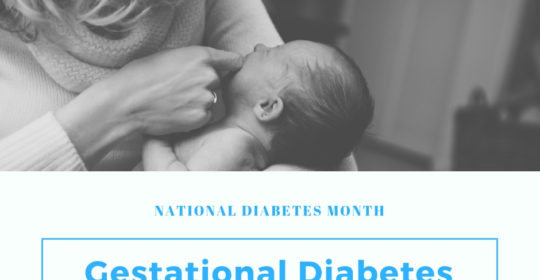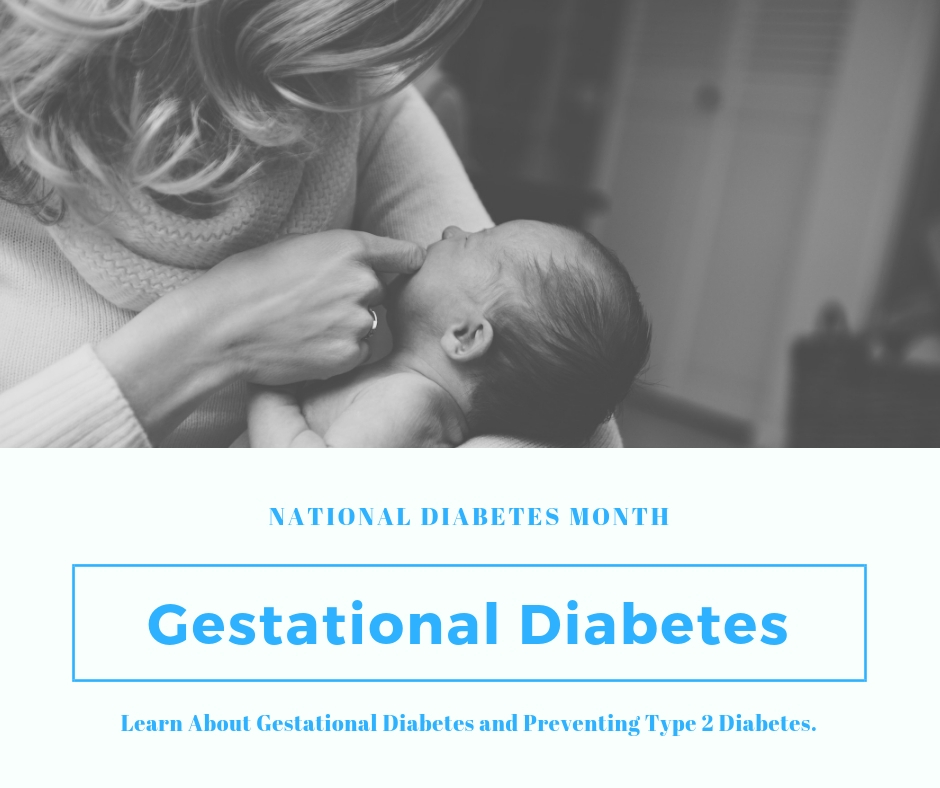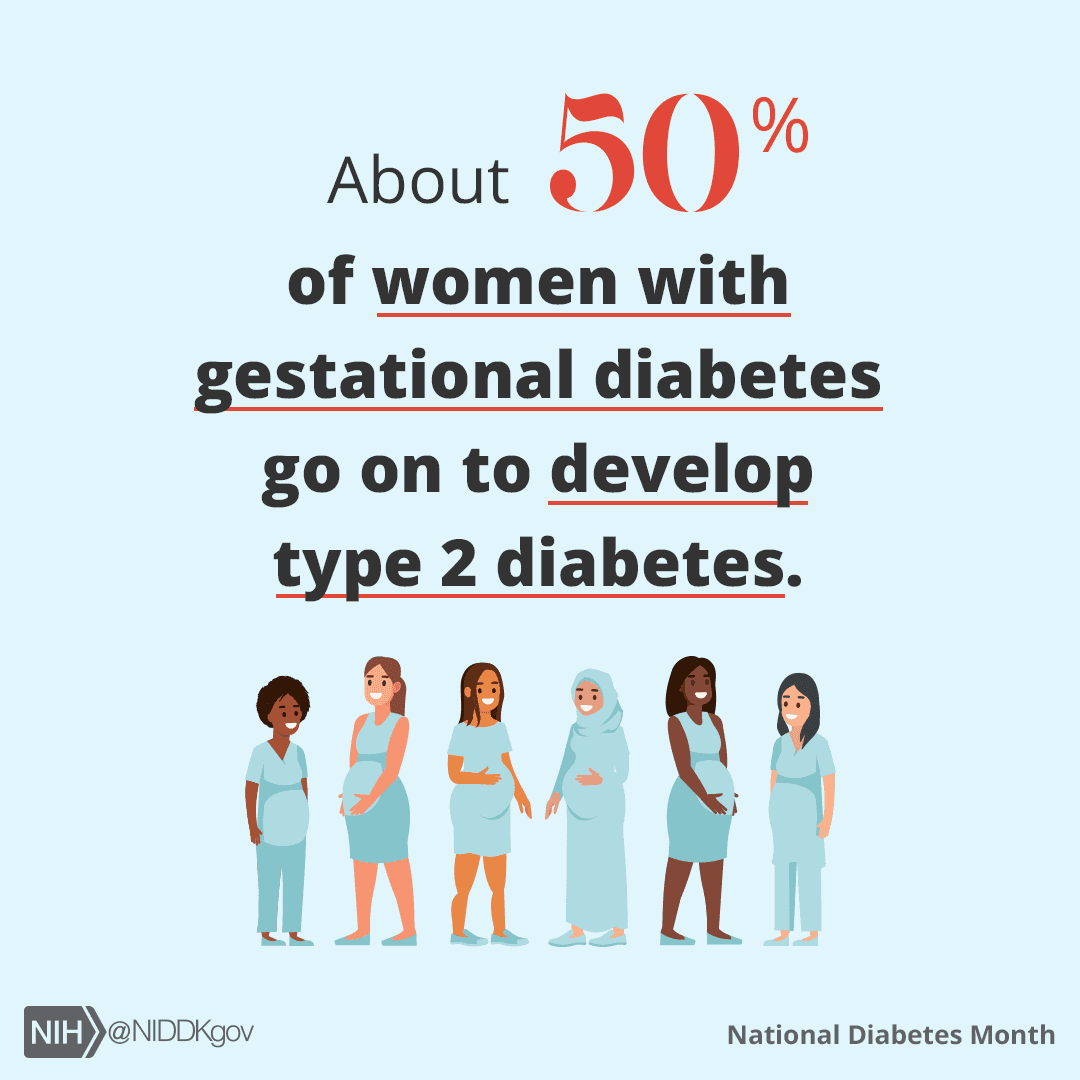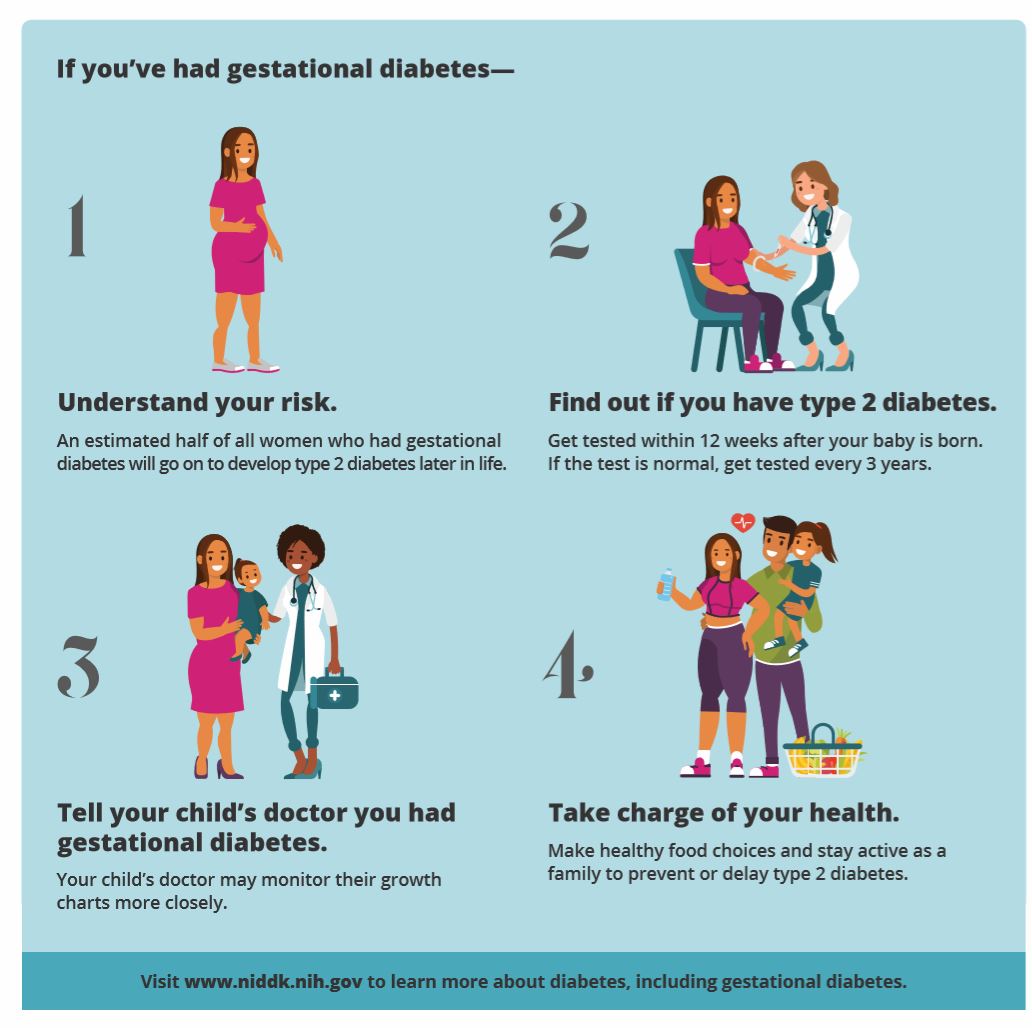
National Diabetes Month: Gestational Diabetes

November is National Diabetes Month, a time when communities across the country team up to bring attention to diabetes and its impact on millions of Americans.
The National Institute of Diabetes and Digestive and Kidney Diseases (NIDDK) has focused this year’s campaign into promoting health after gestational diabetes.

What is gestational diabetes?
Gestational diabetes is Gestational diabetes is a type of diabetes that occurs only during pregnancy. Gestational diabetes can cause health problems in both mother and baby. Managing your diabetes can help protect you and your baby.
Most of the time, gestational diabetes goes away after the baby is born. Even if the diabetes goes away, you have a greater chance of getting diabetes — and your child from that pregnancy is at future risk for obesity and type 2 diabetes. In fact, half of all women who had gestational diabetes go on to develop type 2 diabetes.
What causes gestational diabetes?
Gestational diabetes occurs when your body can’t make the extra insulin needed during pregnancy. Insulin, a hormone made in your pancreas, helps your body use glucose for energy and helps control your blood glucose levels.
During pregnancy, your body makes special hormones and goes through other changes, such as weight gain. Because of these changes, your body’s cells don’t use insulin well, a condition called insulin resistance. All pregnant women have some insulin resistance during late pregnancy. Most pregnant women can produce enough insulin to overcome insulin resistance, but some cannot. These women develop gestational diabetes.
What are the symptoms of gestational diabetes?
Gestational diabetes often has no symptoms, or they may be mild, such as being thirstier than normal or having to urinate more often.
How can gestational diabetes affect my baby?
High blood glucose levels during pregnancy can cause problems for your baby, such as:
- Being born too early
- Weighing too much, which can make delivery difficult and injure your baby
- Having low blood glucose, also called hypoglycemia, right after birth
- Having breathing problems
- High blood glucose also can increase the chance that you will have a miscarriage or a stillborn baby.1 Stillborn means the baby dies in the womb during the second half of pregnancy.
- Your baby also will be more likely to become overweight and develop type 2 diabetes as he or she gets older.
How can gestational diabetes affect me?
If you have gestational diabetes, you are more likely to develop preeclampsia, which is when you develop high blood pressure and too much protein in your urine during the second half of pregnancy.
Preeclampsia can cause serious or life-threatening problems for you and your baby. The only cure for preeclampsia is to give birth. If you have preeclampsia and have reached 37 weeks of pregnancy, your doctor may want to deliver your baby early. Before 37 weeks, you and your doctor may consider other options to help your baby develop as much as possible before he or she is born.
Gestational diabetes may increase your chance of having a cesarean section, also called a C-section, because your baby may be large. A C-section is major surgery.
If you have gestational diabetes, you are more likely to develop type 2 diabetes later in life. Over time, having too much glucose in your blood can cause health problems such as diabetic retinopathy, heart disease, kidney disease, and nerve damage.
What increases my chance of developing gestational diabetes?
Your chance of developing gestational diabetes are higher if you:
- are overweight
- had gestational diabetes before
- have a parent, brother, or sister with type 2 diabetes
- have prediabetes, meaning your blood glucose levels are higher than normal yet not high enough for a diagnosis of diabetes
- are African American, American Indian, Asian American, Hispanic/Latina, or Pacific Islander American
- have a hormonal disorder called polycystic ovary syndrome, also known as PCOS
How can I lower my chance of developing gestational diabetes?
If you are thinking about becoming pregnant and are overweight, you can lower your chance of developing gestational diabetes by losing extra weight and increasing physical activity before you become pregnant. Taking these steps can improve how your body uses insulin and help your blood glucose levels stay normal.
Once you are pregnant, don’t try to lose weight. You need to gain some weight for your baby to be healthy. However, gaining too much weight too quickly may increase your chance of developing gestational diabetes. Ask your doctor how much weight gain and physical activity during pregnancy are right for you.
What should I do if I am diagnosed with gestational diabetes?
If you’ve had gestational diabetes:
- Get tested for type 2 diabetes within 12 weeks after your baby is born. If the test is normal, get tested every 3 years.
- Talk to your doctor if you plan to become pregnant again in the future.
- Tell your child’s doctor if you had gestational diabetes.
- keep up healthy habits for a lifetime to prevent or delay type 2 diabetes.

Source:
- National Institute of Diabetes and Digestive and Kidney Diseases
Picture:
- National Institute of Diabetes and Digestive and Kidney Diseases.
- CDC


Most Commented